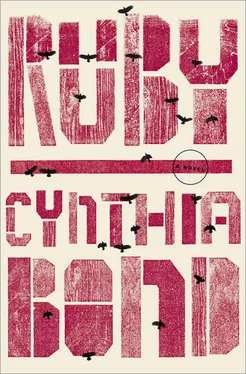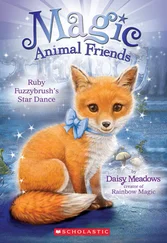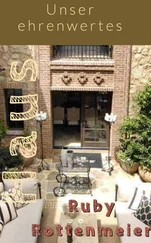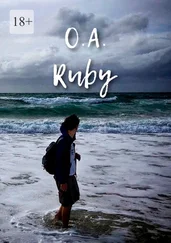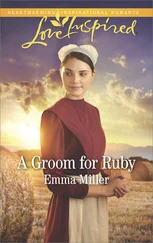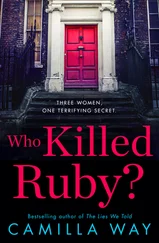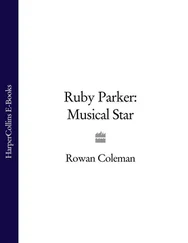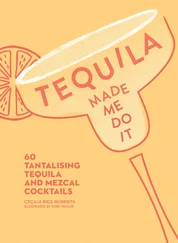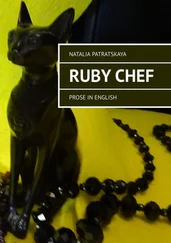Alone on the hill the black book flipped wind-thin pages, spine open on the earth. Ruby lay on her side and watched as they flipped this way and that, this and that, catching the moon in their white. Her body was untouched, unharmed, still she did not move, could not move, only watch the wind and the paper for hours, her heart pounding soft in her chest, until the black night became gray, and gray became the pink of sunrise, and pink became yellow, which became hot white and the pages dried from morning dew and started turning again. She heard a buckboard easing down the road, some kind of tittering as it rolled steadily by. Lucky that it was a back road, lucky not one single human paused at her door. Finally, as the evening settled, Ruby heard the black bird cutting the air with a gentle clucking. She crawled towards it, then discovering the knife still in her hand, brick brown sticking between her fingers, she plunged it into the earth and dragged her body after her. It seemed impossible to use her legs, unthinkable to stand. In this way she made it to the chinaberry as the sun was dipping over the western horizon, orange and plum streaking after it.
The crow stood stock-still on a low branch. One night, one day and another evening with no water, no food, barely taking in enough air. The crow would wait like that until the next morning, not breathing too deeply, lest it ruffle the air around the girl. Ruby wrapped herself about the tree trunk and did not cry.
It was Miss P who found Ruby after three weeks and one day of being lost to God and man. She found her half alive by Marion Lake. Chewed dandelion greens in her mouth, hair twisted with twigs and pebbles. She had wasted to nothing but still held tight to the knife. Miss P had been scouring the woods every evening where she imagined Ruby might hide. When she saw the girl, she eased the knife from her limp hand.
Ruby felt like air against Miss P’s side as she walked her back to P & K Market, and she fell like cotton onto the little cot kept inside the market closet. She gave the girl dandelion root tea with a touch of ginger, and sweetened it with honey. She watched Ruby take a sip without fully waking. She saw the warmth spread onto the child’s lips, her face. Then Ruby was asleep again.
Next, Miss P gave her a spoonful of chicken broth, with big chunks of celery and clear onion. Ruby swallowed it down, then leaned up sharply, eyes jutting about the room. Ruby looked down at her hand, then began feeling for her knife.
“Ain’t no need for that, child.”
Ruby jerked up from the bed. Panic streaked across her face and Miss P tried to calm her, told her that she was perfectly safe, that nobody was going to hurt her, but Ruby stood and tried to run to the door. She fell against the frame and sunk to the floor.
She did not escape until the fifth day, after she had regained some small bit of strength. Miss P did not try to stop her, just as she had not tried to stop her mama, Charlotte Bell, forty-one years ago, when she ran from rape, from hate and a small brown baby named Ruby Bell. Ran to Newton, to Beaumont, and eventually to some old city folks had thought to call New York.
RUBY RAN down the road to Bell land, stopping to catch her breath, then running on. She wanted her knife. The guns pointing in a circle like they had at her Auntie Neva, the cord wrapped around Tanny’s throat, Abby Millhouse’s missing kneecap, Ephram Jennings being dragged away from her home. Ruby knew she needed her knife as a small little match against the night.
The road cut into her feet. The road was her enemy as well, dragging against her, pulling her back to P & K, back to the wolves. She fought her way home, fought her way to her children.
When she reached Bell land she stopped dead. There were no mewling whispers, no cries, no little hands reaching through the soil. The ground was as hollow as an empty womb. She leapt onto the rises, digging furiously, yanking up tufts of soil, huge gulps of dying grass, soft clay and mud; she tore earthworms from their home and cast a dozen roly-polys out of the crumbling brown.
“Where? WHERE? ARE? THEY? ”
Even the crow was silent in the tree. Even the pines turned away. Ruby knew they had been powerless to stop him, powerless to save all of the children who landed in the Dyboù’s gullet while she rested on a soft bed only a mile away from home.
She let out a scream, a mighty screech that boomed up to the treetops, careening so that it pierced the tangle of branches and flew out of the piney woods, out of the burning atmosphere, bolting into space.
Ephram heard her from the road he had been walking to Bell land. He gingerly, carefully picked up an ounce of speed and made it to his Ruby.
He had been dragged away over three weeks ago, the night Ruby had cut into his belly full up to the knife’s handle. The night the congregation nearly killed him, dropping him on his head while trying to drag him away. Over three weeks in the Jasper County Hospital due to an infection, due to the fact that his liver had been “lacerated” and his bowels nicked. He had lost so much blood, the White doctor said, not particularly interested in looking Ephram in the face, that he should, in fact, be dead. It was Miss P’s call that pushed Ephram out of the bed. Away from the smooth brown faces of the Women’s Auxiliary, who plied him with fried chicken and pound cake, even though the nurses insisted he eat soup and crackers until his belly healed up. Away from Celia, who, despite his objection to her presence, stayed every minute of posted visiting hours, and sometimes beyond, propping up his pillow, slipping on clean socks and combing his hair. All the while humming the tune of “At the Cross, at the Cross Where I First Saw the Light.”
The walk had been a hard one. While his stitches had been removed two days before, he was still weak.
Ephram stood over Ruby. He saw the narrow spokes of Ruby’s legs, the reed crook of her arms. She wept as if her entire body were the rising heaves and scratching sobs.
There was nothing to say and so he just stood there, letting the soft of his eyes gently stroke her hair.
She spoke to him, without turning, without moving her lips from the earth, “They all gone.”
“Tell me—”
“My babies. My babies … They gone.”
Ephram felt the air leave his chest. He breathed in her sorrow, and knelt beside her.
Her eyes leveled at him. “Get away from here.”
Her words pushed him back like a fist.
“Go on. Get.”
“I ain’t, Ruby …”
“What else you want?”
“I want you.”
“And what it gone cost?” Hot tears ran down her cheeks. “What I gotta pay to have you?”
“They was wrong, Celia and them, they was worse than fools. But it weren’t me. You put a knife in me.” He lifted his shirt and showed the bandage looped about his right side. “And I’m yet here. Let me help you, baby. Let’s find your children.”
She said it flat and deadpan, “I’ll do it again.”
Ephram stood very still and looked at her. She was broken, more than broken — her eyes were empty, deathly.
“No, you won’t, Ruby.”
A cord snapped inside of Ruby. She threw buckshot and nails in Ephram’s direction. “ What else you come to take? You got what was left of my mind. You bring them here to take my children. What else you want?”
She slammed into him, scratching at his neck, grinding against him. Ephram tried to push her away but she hung on like a panther, face-to-face, yanking his hand between her legs.
“You just a man! Can’t even admit that you came here to get your dick sucked.”
Ephram pushed her back and held her at arm’s length. “Stop it!”
Читать дальше
